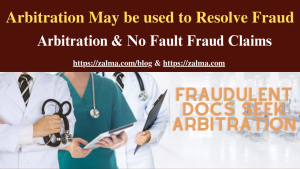Arbitration May be used to Resolve Fraud

See the full video at https://rumble.com/v2y2u76-arbitration-may-be-used-to-resolve-fraud.html and at https://youtu.be/wG2KNhCkyMA
This case is about the relationship between New Jersey healthcare providers and the insurance companies that pay those providers for treating patients for injuries arising from automobile accidents.
In GEICO In v. Caring Pain Management PC a/k/A Careon Pain Management, Jinghui Xie, M.D., First Care Chiropractice Center, L.L.C., and Konstantine Fotiou, D.C., No. 2:22-cv-05017(BRM)(JSA), United States District Court, D. New Jersey (May 31, 2023) the insurer attempted to defeat fraudulent claims under the New Jersey no-fault law.
BACKGROUND
Multiple GEICO insurers (the “Plaintiffs) alleged a series of fraudulent schemes, including unlawful compensation in exchange for patient referrals, misrepresentation of the nature, extent, and results of patient examinations, and false representation regarding compliance with pertinent healthcare laws.
MOTION TO DISMISS
In deciding a motion to dismiss pursuant to Federal Rule of Civil Procedure 12(b)(6), a district court is required to accept as true all factual allegations in the complaint and draw all inferences from the facts alleged in the light most favorable to the non-moving party.
DECISION
The Insurance Fraud Prevention Act (“IFPA”), which was enacted roughly a decade after the No-Fault Law, provides that an “insurance company damaged as the result of a violation of any provision of this act may sue therefor in any court of competent jurisdiction.” In part, the New Jersey Legislature enacted the IFPA to address rising insurance rates resulting from widespread fraud with the clear objective to confront aggressively the problem of insurance fraud in New Jersey by facilitating the detection of insurance fraud and eliminating the occurrence of such fraud through the development of fraud prevention programs.
A person or practitioner violates the IFPA by presenting or preparing false or misleading statements in connection with an insurance claim, or by failing to disclose the occurrence of an event that affects an individual’s entitlement to insurance benefits or the amount of benefits
THE COMMON LAW FRAUD, UNJUST ENRICHMENT, AND RICO CLAIMS
The No-Fault Law’s language, legislative intent and application cover Plaintiffs’ claims for common law fraud, unjust enrichment and RICO. The plain language of the No-Fault statute provides that “[a]ny dispute regarding the recovery of . . . benefits provided under personal injury protection coverage . . . arising out of the operation, ownership, maintenance or use of an automobile may be submitted to dispute resolution on the initiative of any party to the dispute.” (emphasis added)
Plaintiffs’ claims involve:
a dispute by [Plaintiffs]
involving Defendants’ recovery of PIP Benefits that
one party wishes to send to arbitration.
Consequently, Plaintiffs’ common law fraud, unjust enrichment, and RICO claims fall within the statute’s arbitration provision. Having reviewed the No-Fault Law’s language, legislative intent, application, and arbitrable claims with Plaintiffs’ claims for common law fraud, RICO and unjust enrichment, the USDC found there was nothing preventing an arbitrator from hearing the claims.
New Jersey IFPA Claim
The plain meaning of the New Jersey Insurance Fraud Prevention Act (IFPA) requires insurers’ claims for damages under the IFPA be judicially resolved. Although the statute states that insurers “may sue in any court of competent jurisdiction,” arbitration does not constitute a court of competent jurisdiction.
To the extent the IFPA may seem to contradict the No-Fault Law, state legislatures are presumed aware of prior enactments, including the pre-existing No-Fault Law. The state legislature could have provided a carve out for PIP Benefits disputes in the IFPA but did not.
The USDC concluded that to avoid duplicative findings, the Court, in its discretion, declined to separately entertain the IFPA claim under the Declaratory Judgment Act. To the extent Plaintiffs seek a declaration that Defendants violated RICO, committed common law fraud, or are liable for unjust enrichment, an arbitrator shall decide that issue.
Clearly, the health care providers who were accused by GEICO of fraud felt that they had a better chance of success with an arbitrator rather than a federal judge. The judge found the statutes allowed for arbitration and sent the fraud to an arbitrator. I would like to be that arbitrator and hope the parties get an arbitrator who dislikes insurance fraud as much as I do, and find they would have done better with a federal judge. GEICO should be honored for working to defeat fraud by attempting to take the profit out of the fraud.
 (c) 2023 Barry Zalma & ClaimSchool, Inc.
(c) 2023 Barry Zalma & ClaimSchool, Inc.
Please tell your friends and colleagues about this blog and the videos and let them subscribe to the blog and the videos.
Subscribe and receive videos limited to subscribers of Excellence in Claims Handling at locals.com https://zalmaoninsurance.locals.com/subscribe.
Consider subscribing to my publications at substack at https://barryzalma.substack.com/publish/post/107007808
Go to Newsbreak.com https://www.newsbreak.com/@c/1653419?s=01
Follow me on LinkedIn: www.linkedin.com/comm/mynetwork/discovery-see-all?usecase=PEOPLE_FOLLOWS&followMember=barry-zalma-esq-cfe-a6b5257
Daily articles are published at https://zalma.substack.com. Go to the podcast Zalma On Insurance at https://podcasters.spotify.com/pod/show/barry-zalma/support; Follow Mr. Zalma on Twitter at https://twitter.com/bzalma; Go to Barry Zalma videos at Rumble.com at https://rumble.com/c/c-262921; Go to Barry Zalma on YouTube- https://www.youtube.com/channel/UCysiZklEtxZsSF9DfC0Expg; https://creators.newsbreak.com/home/content/post; Go to the Insurance Claims Library – https://zalma.com/blog/insurance-claims-library.
Like this:
Loading…
Related







